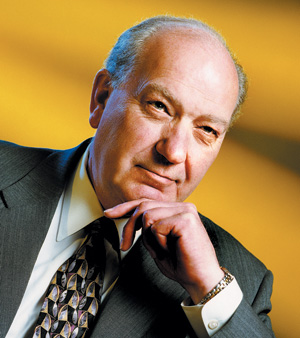
 With about 100 lawyers working in offices in Calgary and Edmonton, the century-year-old law firm of Parlee McLaws LLP is one of the largest regional firms in Alberta. For managing partner Terrence Cockrall, who has been practising corporate/commercial law for more than 40 years, the challenge is to manage offices in two cities with different cost structures, both experiencing a boom, and finding the right lawyers and support staff that will help the business law firm continue its independence.
With about 100 lawyers working in offices in Calgary and Edmonton, the century-year-old law firm of Parlee McLaws LLP is one of the largest regional firms in Alberta. For managing partner Terrence Cockrall, who has been practising corporate/commercial law for more than 40 years, the challenge is to manage offices in two cities with different cost structures, both experiencing a boom, and finding the right lawyers and support staff that will help the business law firm continue its independence.
What are the biggest challenges of managing your firm?
Obviously finding and keeping good professionals are a big challenge in the current marketplace. About 10 years ago we engaged a professional services consulting firm, Hildebrandt, to assist us in revamping our governance structure and help us develop a strategic plan. One of the presentations to us . . . was that one of the biggest challenges we would be faced with was what they referred to as the 'war for talent.' It wasn't a really big issue for us at the time, but I must say that their prediction I now believe to be quite accurate. The discussion I have with other managing partners both in Canada and the U.S., it seems to be in the top three of every firm's list.
How do you deal with that?
It's difficult. We haven't really had any difficulty recruiting really good talent fresh out of law school. We have noticed in the last few years that lawyers seeking articling positions are concerned about finding a firm that will give them training, but also finding a place where they will work hard but have some balance to their lifestyle. We expect our associate lawyers to have about 1,600 billable hours a year. Many of our competitors, particularly in the Calgary market, have much higher billing requirements.
[The bigger challenge is] finding senior lawyers in the area of lateral hires. There's just so many opportunities for them in Alberta, both in the private sector and as corporate counsel. The competition is very difficult. What you have to do is be patient and persistent. Sooner or later you find a lawyer that is the right fit for your firm from both a talent and experience point of view.
What's the Edmonton market like versus Calgary?
With the way the economy is going in Alberta, Edmonton is hot and Calgary is a raging inferno. The cost structures in Calgary are significantly higher than they are in Edmonton. Office space in Calgary is probably twice the base rate it is in Edmonton. Operating costs also seem to be higher. Staff salaries and lawyer salaries are higher and hourly rates are higher. When you operate like we do on a one-firm basis . . . it's a challenge to try and factor all those things into the equation, particularly at compensation time. The biggest management trick is trying to make all the partners at the firm aware of the situation that's going on in the other office so they have a better understanding of the challenges you face. If they don't know what's going on, that's when they start speculating. That can led to problems.
How does a firm like yours compete with the larger national players?
One of the things we have done a few year ago is joined a network called the World Services Group, 130-member firms in 115 countries around the world. We have the ability to seek assistance from them for our clients when it's required.
How important is the Toronto market to your business model?
It would be fair to say that Toronto remains our most significant referral source. The world is shrinking.
Will you build out into other western cities?
We don't have any plans to expand into other areas. I think it would have to be something client-driven. Our vision statement contemplates that we will continue to be a strong regional firm. You never say never to anything.
What keeps you awake at night?
I generally sleep soundly. One area that I do stay awake at night is almost always an internal people problem. Usually the most stressful issues I have to deal with is when there's a conflict or issue among lawyers. That's the most stressful.